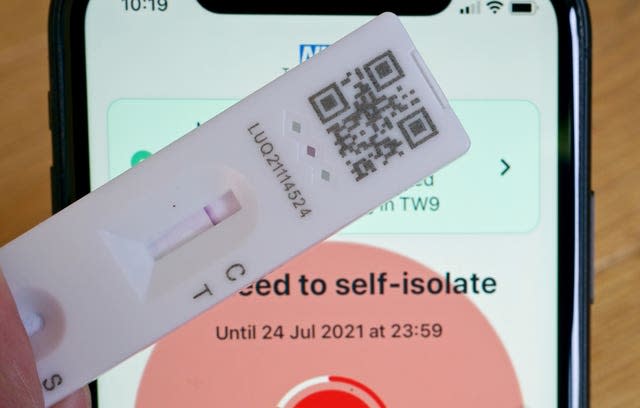Too late for boosters alone to prevent high hospital admissions, warn experts
The scaled-up booster rollout to all adults will not take effect quickly enough to prevent what could be as many as 2,000 hospital admissions each day in England by the end of the year, experts have warned the Government.
Despite a ramping up of efforts to offer third jabs to everyone aged 18 and above by the end of December, scientists said the impact on the spread of the Omicron variant and mild or severe disease will not happen in time “to mitigate these hospitalisations for the rest of 2021”.
Boris Johnson has hailed the importance of the booster programme, tweeting on Saturday to again urge everyone to “please play your part and Get Boosted Now”.

The Prime Minister has previously described the rollout and Plan B measures, which were voted through Parliament earlier this week despite a rebellion from some Tories, as the “right mixture” of approaches.
But a document from the Scientific Pandemic Influenza Group on Modelling, Operational sub-group (SPI-M-O) dated Wednesday and published on Saturday, warned that without further measures, figures in England could hit a “minimum of 3,000 hospital admissions per day at their peaks, with some scenarios having significantly worse outcomes during the first few months of 2022”.
They advised that in order to prevent “such a wave of hospitalisations, more stringent measures would need to be implemented before 2022”.
The experts stated that it is “highly likely” there will be between 1,000 and 2,000 hospital admissions per day in England by the end of the year, and that many of these “are already ‘in the system’ due to the lags between infection, symptom onset, and the subsequent need for health care”.
They added: “The recently announced expanded and expedited booster vaccination programme will not dampen transmission or disease progression in time to mitigate these hospital admissions for the rest of 2021.”

The modellers said such high levels of hospital admissions would “almost certainly lead to unsustainable pressure on health and care settings” and added that even if disease was mild there would be consequences such as absences from work or school.
They suggested that to “significantly reduce” the peak of such a wave, more stringent restrictions than those currently in place under Plan B would be needed.
One scenario considered action equivalent to Step Two of the Government’s road map out of lockdown earlier this year, which saw hospitality venues serve people outdoors, and limits on social mixing, being taken.
If restrictions equivalent to Step Two were removed in mid-January at the end of the booster rollout “immunity build up means there is the potential to avoid an exit wave of infections, hospitalisations, and deaths on release of measures”, the experts said.
They insisted the timing of such measures “is crucial”, and that if they were brought in too late “it is less likely that these would prevent considerable pressure on health and care settings”.
They stressed that their models are not Government policy options or proposals, and not forecasts or predictions, but are instead a “summary informed by scenarios modelled by multiple groups to consider their possible impact” on the spread of the variant.
The advisors stated that there is still “no strong evidence” that Omicron infections are either more or less severe than Delta infections.
Meanwhile, a paper by the Environmental Modelling Group (EMG) and Scientific Pandemic Insights Group on Behaviours (SPI-B), also dated December 15, warned of the dangers Omicron presents to care homes and other “high-risk environments”.
They stated that settings such as hospitals, care homes, prisons and homeless shelters are “extremely vulnerable” to the variant, and advised enhanced prevention and control measures, as well as more frequent testing.
They described such measures as “urgent and essential” alongside higher levels of vaccination uptake “to reduce potential for and severity of outbreaks, and to prevent outbreaks spilling back into the community”.
The advisers also said that isolation of close contacts of a positive case would likely be more effective at preventing spread than daily lateral flow testing, adding that it would lessen demand for rapid tests “if supply is limited”.
One of the measures voted through Parliament on Tuesday saw the requirement for suspected Omicron contacts who are fully vaccinated to isolate replaced with daily testing, and Mr Johnson has said the change would “keep things moving” and avoid another so-called pingdemic.


